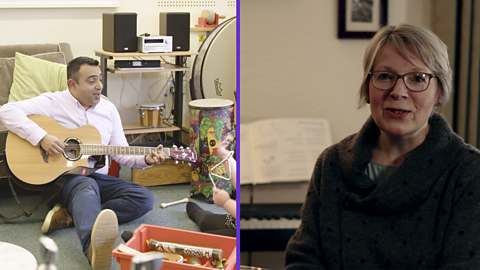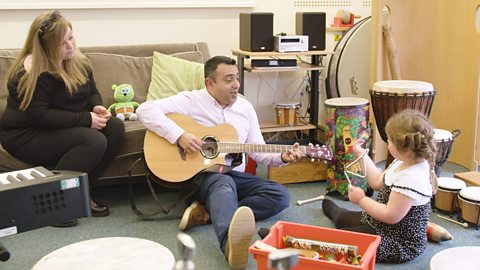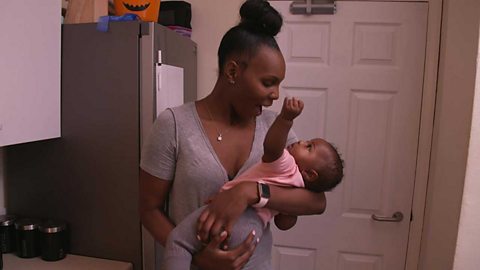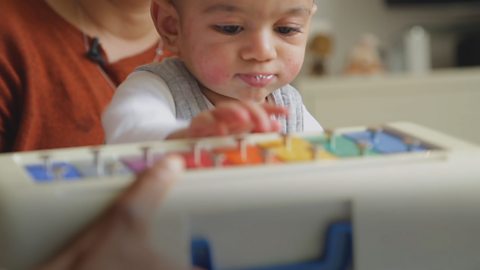
We put some of your questions about music and music therapy from our Instagram Q and A session to music therapists Ray Travasso and Jojo Lander.
Here, they have loads of advice when it comes to music and singing with children.

Why does my child only sing the odd word in each line?
Ray:
It's quite normal for young children to sing the last word in a line or random words from nursery rhymes. As they become more familiar with the songs, you may notice that they are able to sing more words or sing with more confidence.
The reason why they are only singing odd words, is that their brains are developing ways of linking the different words together. That takes some time and skill to do. You may like to try adding some actions or signing to the words as that can help bridge words and actions together, thus encouraging and supporting more development.
How can I introduce my baby to an instrument I play?
Ray:
If you can play a musical instrument, that is fantastic! There are lots of ways to use it to interact with your baby.
Try playing a piece of music that you know well or a favourite nursery rhyme. You could also try playing single notes and observing how your baby reacts to the sound. Try long and sustained notes, high notes and low notes. Play a tune quick and then play it slowly – all the time, notice how your baby is reacting and responding to the music. If it is too much, they will turn away. If they are interested, they will go still to listen or even reach out to touch it. Just try this in short chunks. If they become disinterested, don’t take it personally!
The most important aspect about playing music with your baby is for it to be fun and explorative. What does your baby want to do naturally with the instrument? They may want to touch it or see the reflection of the light from it. They may also be interested in the vibrations it makes – all the time, try to enter into their world and be curious to know what they are interested in.
How do I introduce my child to a musical instrument?
Jojo:
Explore easy to play instruments with a good sound quality. Notice which ones they are interested in. Children, like adults, remain interested if the sound is rewarding.
Here are a few things you could try:
Your voice is the best instrument to start with. You could try singing and playing around with percussion - drums, shakers and tambourines.
The notes on a piano, keyboard or set of chime bars offer a ready-made sequence of notes.
A guitar can be tuned to any chord which sounds nice to you, no need to know finger patterns. Hold the guitar and sit face-to-face with your child - encourage them to reach out and take turns to pluck or strum.
A harmonica is a great instrument to blow and fits in your pocket.
Bowed string instruments like the violin and cello need a little more concentration and physical organisation. If you begin on an easier instrument, all the musical skills your child learns will be transferred to other instruments as they grow.
Other than nursery rhymes, how can I build music into daily play?
Jojo:
Make up your own songs about what you are doing, where you are going, who and what you might see. It helps your child to understand the world and prepare for joining in with plans. Dance, sway and bounce in time.
Place a drum on their feet, hands or tummy and tap out the rhythm of words as you say them.
Listen to all the sounds your child makes and copy them back - wait - and listen for their response. Repeat!
Play musical chairs - start and stop your sound / movement - surprise them, wait for a little signal that your child wants to hear more … and start again with a wiggle and a giggle.
Choose different music tracks or make up songs to help your child understand different times of day - getting ready to go out, play time, nap time, bath time, bed time. They are already learning and anticipating what comes next. This will help them feel secure.
Should I be worried about the volume of instruments?
Ray:
It's important that you are not playing the instruments or making loud noises very close to their ears. Also avoid using headphones. If the sounds are a few feet in front of them, that should be fine. If it's too loud, your toddler may move away or avert their gaze, so look out for this. If the noise is too much, then it may be best to move the instruments back a bit.
Should I have background music playing around the house with baby?
Jojo:
Everyone is different and views are mixed. High intensity background music can be distracting while calm, low volume music or sound can be positive and comforting.
Your child learns about emotion and the meaning behind your words from listening to and processing the many ups and downs in the tone of your voice, long before they understand the actual words. They need to be able to hear you and sounds around them to make sense of the world.
Should we listen to songs with words to help children's learning?
Ray:
It's healthy to listen to all kinds of music, from a range of genres and styles. Listening to simple children’s songs with words may be nice to help language development. However, I would encourage you also to try singing your own favourite songs, no matter what they are.
You could also try listening to songs from around the world – there are some lovely nursery rhymes from different cultures.
Have fun with music, make it enjoyable and a special time for you and your baby.
Is music therapy good for children that can't speak yet?
Jojo:
Music therapy can have an enormous impact at this stage. The brain is developing fast in the early years. Communication during the pre-verbal stage promotes secure bonding and attachment, leading to enriched relationships and improved life chances.
Music contains all the prosodic elements of speech and language minus the words.
These include melody in the ups and downs of your voice, rhythm, volume, tempo, changes in emotional intensity or mood, turn-taking, waiting, listening, responding and silence.
I don't have access to a music therapist. What can I do at home?
Ray:
Music therapy is about finding ways to connect with someone and helping them in different ways, depending on their needs. Music therapists often try to find ways of using music to communicate with children and help them to express themselves in music.
There are lots of games and activities that you can do to interact with your child through using different sounds and music. For example, if your child makes a vocal sound, try repeating it and sing it back to them. Try to observe your child’s mood and think about what type of music would accompany it. If they are upset, think about what kind of music may be useful to help calm them.
There is no greater instrument than your singing voice – give it a go! Through singing and playing music with your child, your relationship will develop and get even stronger. In turn, a better relationship with you will help them to develop well.
Can music therapy benefit adults?
Jojo:
Music therapists work with all ages and abilities across the life span, from pre-birth to the end of life. Sessions take place with individuals, groups and families in education, health and care settings and in people’s homes.
There are ways you can try out simple music therapy yourself:
You might like to try listening to music while keeping a positive feeling or image in your mind.
Think about one single thing that felt good yesterday, earlier today, or right now? A walk, a memory, a complement?
Choose a song or 2-3 minutes of music that you enjoy and might match your thought, share this good feeling, like a good friend would.
As you listen, only think of this one good thought, try hard to shut out other things. Listen again, focus, know how good it feels. Listen one more time and breath in that feeling with the music.
Was it ok? Anything new or surprising? Hang on to what felt good. It gets better the more you do it!
Ray:
Music can help our mental health in so many different ways. Music can help motivate us to get moving and exercising. It can also help us to relax and chill-out. Listening to our favourite songs, bands and artists is important as it can make us feel good about ourselves and bring positive memories. Try learning to play a musical instrument or sing along with the radio. Singing is proven to help lower blood pressure and anxiety levels.






